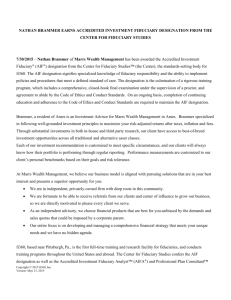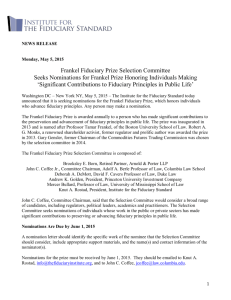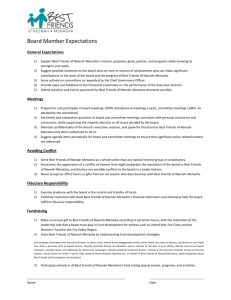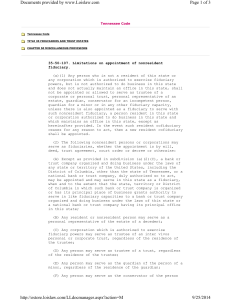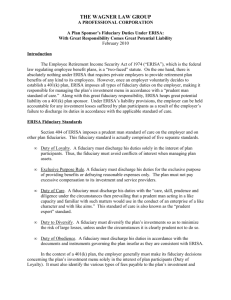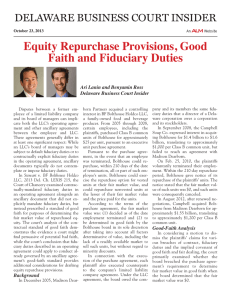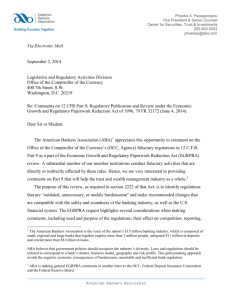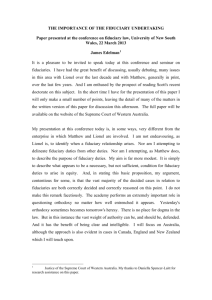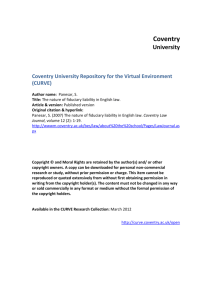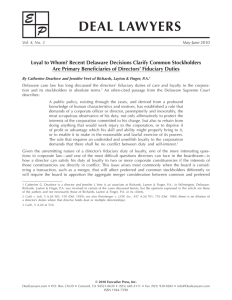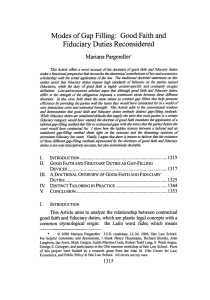November 5, 1999 DELAWARE CHANCERY COURT RULINGS ON
advertisement
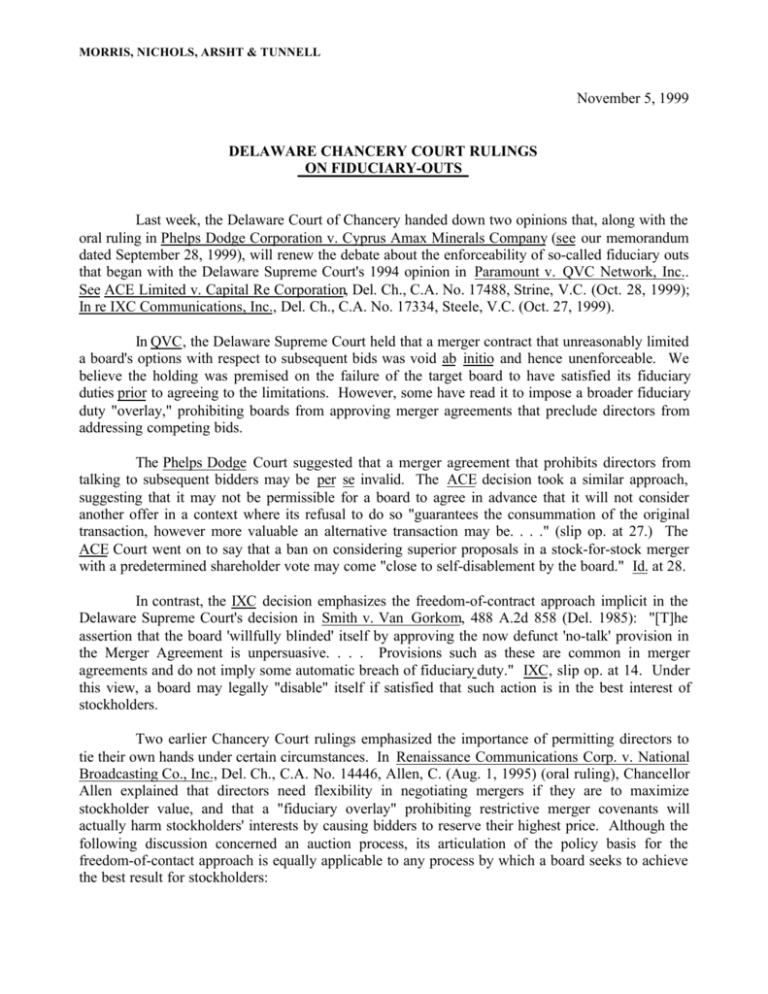
MORRIS, NICHOLS, ARSHT & TUNNELL November 5, 1999 DELAWARE CHANCERY COURT RULINGS ON FIDUCIARY-OUTS Last week, the Delaware Court of Chancery handed down two opinions that, along with the oral ruling in Phelps Dodge Corporation v. Cyprus Amax Minerals Company (see our memorandum dated September 28, 1999), will renew the debate about the enforceability of so-called fiduciary outs that began with the Delaware Supreme Court's 1994 opinion in Paramount v. QVC Network, Inc.. See ACE Limited v. Capital Re Corporation, Del. Ch., C.A. No. 17488, Strine, V.C. (Oct. 28, 1999); In re IXC Communications, Inc., Del. Ch., C.A. No. 17334, Steele, V.C. (Oct. 27, 1999). In QVC, the Delaware Supreme Court held that a merger contract that unreasonably limited a board's options with respect to subsequent bids was void ab initio and hence unenforceable. We believe the holding was premised on the failure of the target board to have satisfied its fiduciary duties prior to agreeing to the limitations. However, some have read it to impose a broader fiduciary duty "overlay," prohibiting boards from approving merger agreements that preclude directors from addressing competing bids. The Phelps Dodge Court suggested that a merger agreement that prohibits directors from talking to subsequent bidders may be per se invalid. The ACE decision took a similar approach, suggesting that it may not be permissible for a board to agree in advance that it will not consider another offer in a context where its refusal to do so "guarantees the consummation of the original transaction, however more valuable an alternative transaction may be. . . ." (slip op. at 27.) The ACE Court went on to say that a ban on considering superior proposals in a stock-for-stock merger with a predetermined shareholder vote may come "close to self-disablement by the board." Id. at 28. In contrast, the IXC decision emphasizes the freedom-of-contract approach implicit in the Delaware Supreme Court's decision in Smith v. Van Gorkom, 488 A.2d 858 (Del. 1985): "[T]he assertion that the board 'willfully blinded' itself by approving the now defunct 'no-talk' provision in the Merger Agreement is unpersuasive. . . . Provisions such as these are common in merger agreements and do not imply some automatic breach of fiduciary duty." IXC, slip op. at 14. Under this view, a board may legally "disable" itself if satisfied that such action is in the best interest of stockholders. Two earlier Chancery Court rulings emphasized the importance of permitting directors to tie their own hands under certain circumstances. In Renaissance Communications Corp. v. National Broadcasting Co., Inc., Del. Ch., C.A. No. 14446, Allen, C. (Aug. 1, 1995) (oral ruling), Chancellor Allen explained that directors need flexibility in negotiating mergers if they are to maximize stockholder value, and that a "fiduciary overlay" prohibiting restrictive merger covenants will actually harm stockholders' interests by causing bidders to reserve their highest price. Although the following discussion concerned an auction process, its articulation of the policy basis for the freedom-of-contact approach is equally applicable to any process by which a board seeks to achieve the best result for stockholders: MORRIS, NICHOLS, ARSHT & TUNNELL I think it is different if the board negotiates highly particular protections in order to get the highest price in the auction, because if the fiduciary duty always overrides an auction, you have just made auctions less valuable, because people obviously won't have the incentive to issue the best price. So it is self defeating for the fiduciary law to say in all events a higher and later price gives rise to a fiduciary obligation to breach the contract. . . . . Now, that gets you into this problem, because people tend to think of fiduciary duties as supervening. But unless you say that these fiduciary duties are afunctional -- that is, they operate without regard to the impact they have -- then there must be circumstances in which the contracts can essentially -- in this auction context essentially remove from the board the later discretion. They can remove it from themselves if they do it the right way and they have to be able to do that. Otherwise the auctions won't work. Id., tr. at 43-46 (emphasis added). Vice Chancellor Jacobs implicitly endorsed the freedom-of-contract approach in Malpiede v. Townsend, Del. Ch., C.A. No. 15943 (Sept. 29, 1997), where he explained that the court's role in enforcing fiduciary duties should be to assess process, not result, and that in some cases, even where a board meets its duties, the stockholders may not get to take a later, but higher, price. Put another way, under the freedom-of-contract approach, the reviewing court determines whether the board met its fiduciary duties in agreeing to limit its future options. The Phelps Dodge, ACE and IXC decisions have put a new spotlight on the freedom-ofcontract and fiduciary overlay approaches described above. The debate is highly nuanced and only now beginning in earnest. John F. Johnston Andrew M. Johnston Frederick H. Alexander 142766
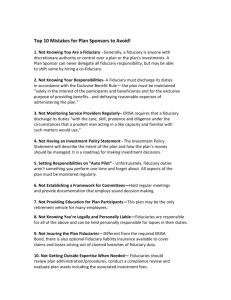

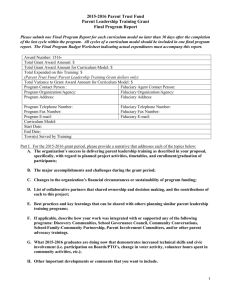
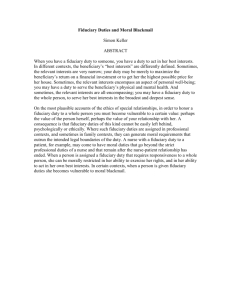

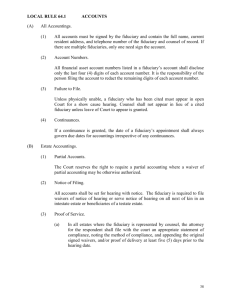
![Mark Whitenack Digital Assets PowerPoint Presentation []](http://s2.studylib.net/store/data/005383425_1-9cf830a5f2e9fc777daa963eb9460c8e-300x300.png)

